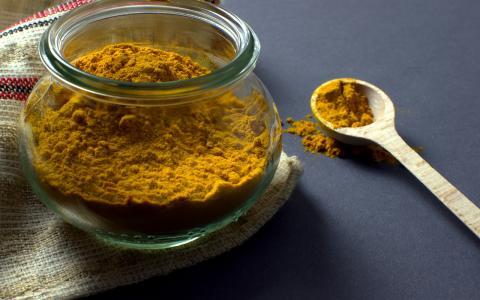
Ah, winter—the season of retreating indoors, finding every way to keep warm, and snuggling up with your favorite book or Netflix show for a slow descent into hibernation, solitude, and a fair amount of seasonal down time.
While the frigid cold winter weather outside can affect your energy levels and leave you with the sluggish winter blues, there are seasonal winter herbs that can also lift you out of your winter funk to revitalize your well-being and mood with some natural herbal supplements.
In the words of the famous French philosopher Albert Camus, “In the depth of winter, I finally learned that within me there lay an invincible summer.” And in order to help us connect to our dormant summer, vitality, and good-feeling vibes, the following five winter herbs can do wonders for healing our lethargy and our late winter woes.
1. Balsam Fir Oil
Balsam fir oil is known for its uplifting and soothing effect on the body and the respiratory system when applied topically or diffused in tea. Its distinctively woodland and pine scent smells like a Christmas tree—and it heals like one too. If you’re run down by an oncoming cold or sore throat, or your muscles and joints are aching, then balsam fir oil might be great to have on hand. This type of oil is steam distilled from the needles of balsam fir trees and contains active chemicals and crucial plant-derived compounds that have been proven to have an antibacterial effect on diseases like E. coli. Balsam fir oil can help your body to rid itself of harmful toxins while soothing us on a deeply cellular level.
2. Cedarwood Oil
If your skin’s feeling itchy and dry or looking ashy like many of us during the winter months, you might want to give cedarwood oil a try. This anti-inflammatory herb can treat the inflammation that leads to skin sensitivity, dryness, or even a common skin disorder like acne or eczema due to its antifungal properties. In fact, you can put cedarwood oil on your wound and it will help relieve your pain with its naturally occurring analgesic activity by positively interacting with your central nervous system and peripheral pain mediators. But that’s not all. Cedarwood oil can also relieve spasmodic conditions like asthma, restless leg syndrome, and respiratory seizures with its soothing anxiolytic or anti-anxiety properties that have been proven to help keep your mood elevated and your depression and anxiety at bay.
3. Ginseng Extract
The botanical name for ginseng is panax, which roughly translates to “all heal” in Greek and true to its name, ginseng is one of the most popular herbal medicines in the world. While the winter and cooler months may bring on a seasonal affective disorder that may leave you feeling moody, irritable, lacking energy, and longing for the summer sunshine, ginseng can enhance your mood and your cognitive performance. So, if you find yourself overeating during these chilly months, a few drops of some ginseng extract in your tea can also seriously curb your appetite and boost your metabolism by increasing your glucose uptake. And due to this, incorporating ginseng into your diet can be an extremely useful herb for treating diabetes and obesity.
4. Garlic
These days it seems it's not enough to say that raw garlic is good for us. But that’s because eating raw or cooked garlic regularly can contribute to numerous and complex health benefits and it's nothing short of mind-blowing when you look at the countless peer-reviewed research. Garlic is an incredible superherb that supports our immune system with bioactive sulfur compounds that can reverse the early stages of heart disease, significantly reduce the risk of breast cancer, help us to control our high blood pressure and treat colds and infections with its antiviral and antifungal properties. Luckily for us, garlic also can add tremendous flavor to many different kinds of dishes as it takes on a well-balanced nutty flavor when sautéed or roasted. You can sauté it over medium heat before adding other vegetables and meat to make a stir fry, quesadilla, burrito, or pasta sauce, or incorporate into any recipe that calls for it.
5. Turmeric Root or Oil
Turmeric root, otherwise known as the Curcuma longa plant, is an ancient Ayurvedic herbal medicine that has stood the test of time. It's stock full of healing properties that make it one of the most potent medicinal herbs known to science. There are literally hundreds of studies that document the success of turmeric root for its antibacterial, antimicrobial, anti-allergic, antifungal, antiparasitic, anti-worm and antiviral properties. But as far as the winter blues are concerned, turmeric root can help us to feel better because it acts upon the body like a natural mood balancer that has an antidepressant effect and helps you lessen the symptoms of anxiety and depression—and in some cases prevent it. Whether you choose to consume turmeric root as a part of your diet, drop two or three drops of turmeric oil in your tea, or massage approximately five drops of turmeric oil (combined with a carrier oil like coconut oil) into your skin, you can reap its wide-reaching health benefits and strengthen your immune system by preventing the development of inflammation that leads to colon cancer and combating the development of breast cancer.








